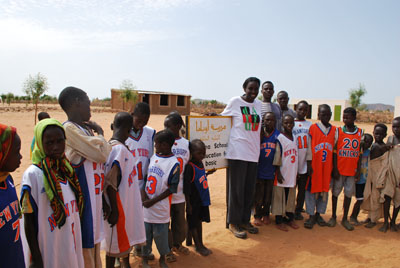
As the coordinator for Darfur Dream Team Sister Schools program, Stella recently traveled to eastern Chad with Enough senior advisor Omer Ismail to conduct a rapid assessment in Djabal and Goz Amer, twin refugee camps located near the town of Goz Beida in eastern Chad. The information and testimonies they collected will be used to raise awareness about the plight of Darfuri refugees and devise the best ways for engaging with the students in the camps through the Sister Schools program.
UPDATE: Please see An Apology, dated July 13.
Rows of eager faces strained to see what was causing such a commotion. They waited excitedly, pressing forward for a peek. It was our second day visiting Djabal refugee camp and Omer and I were distributing New York Knicks basketball jerseys to the refugee children living in the camp. The Madison Square Garden office of merchandise and special projects generously donated the jerseys for Darfuri refugee children, and they proved right away to be prized possessions. As word of our giveaway spread, children flooded our area from all sides.
To fairly distribute the jerseys, Omer and I separated the children into groups based on which blocks in the camp they lived. Then we began to hand the jerseys out as evenly as possible. The scramble began, and within minutes the jerseys were devoured. Though we informed them that we had no more to give, the children still scrambled up to us to peer into the empty bag to ensure a jersey had not escaped our notice.
The mad dash for the jerseys is emblematic of the constant struggle refugees have for food, education, and basic supplies. The Darfur Dream Team’s Sister Schools Program seeks to address one of the major needs of the refugee children in Djabal: Quality education. The Sister Schools Program brings together a diverse coalition — students, professional athletes, and international, private, and non-profit organizations — to address this need by providing school supplies and teacher training and by linking U.S. schools with sister schools in the 12 refugee camps in Chad.

